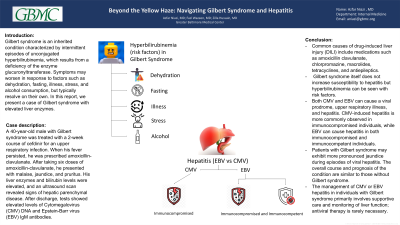Sunday Poster Session
Category: Liver
P1106 - Beyond the Yellow Haze: Navigating Gilbert Syndrome and Hepatitis
Sunday, October 22, 2023
3:30 PM - 7:00 PM PT
Location: Exhibit Hall

Has Audio

Azfar Niazi, MD
Greater Baltimore Medical Center
Towson, MD
Presenting Author(s)
Azfar Niazi, MD1, Fazl Rahim Wazeen, MD1, Zilla Hussain, MD2
1Greater Baltimore Medical Center, Towson, MD; 2Greater Baltimore Medical Center, Baltimore, MD
Introduction: Gilbert syndrome is an inherited condition characterized by intermittent episodes of unconjugated hyperbilirubinemia, which results from a deficiency of the enzyme glucuronyltransferase. Symptoms may worsen in response to factors such as dehydration, fasting, illness, stress, and alcohol consumption, but typically resolve on their own. In this report, we present a case of Gilbert syndrome with elevated liver enzymes.
Case Description/Methods: A 40-year-old male with Gilbert syndrome was treated with a 2-week course of cefdinir for an upper respiratory infection. When his fever persisted, he was prescribed amoxicillin-clavulanate. After taking six doses of amoxicillin-clavulanate, he presented with malaise, jaundice, and pruritus. His liver enzymes and bilirubin levels were elevated, and an ultrasound scan revealed signs of hepatic parenchymal disease. After discharge, tests showed elevated levels of Cytomegalovirus (CMV) DNA and Epstein-Barr virus (EBV) IgM antibodies.
Discussion: Amoxicillin-clavulanate is a common cause of drug-induced liver injury (DILI), along with other medications such as chlorpromazine, macrolides, tetracyclines, and antiepileptics. Gilbert syndrome itself does not increase susceptibility to hepatitis; however, individuals with this condition may experience temporary elevations in bilirubin levels during episodes of acute illness or stress. Both CMV and EBV can cause a viral prodrome, upper respiratory illness, and hepatitis. CMV-induced hepatitis is more commonly observed in immunocompromised individuals, while EBV can cause hepatitis in both immunocompromised and immunocompetent individuals. Patients with Gilbert syndrome may exhibit more pronounced jaundice during episodes of viral hepatitis. The management of CMV or EBV hepatitis in individuals with Gilbert syndrome primarily involves supportive care and monitoring of liver function; antiviral therapy is rarely necessary.
In conclusion, it is crucial to carefully evaluate the need for potentially hepatotoxic medications to minimize the risk of liver injury. EBV can cause self-limiting hepatitis in immunocompetent individuals, while CMV is typically associated with hepatitis in immunocompromised individuals and rarely affects immunocompetent individuals. Although hepatitis in individuals with Gilbert syndrome may present with more significant hyperbilirubinemia, the overall course and prognosis of the condition are similar to those without Gilbert syndrome.
Disclosures:
Azfar Niazi, MD1, Fazl Rahim Wazeen, MD1, Zilla Hussain, MD2. P1106 - Beyond the Yellow Haze: Navigating Gilbert Syndrome and Hepatitis, ACG 2023 Annual Scientific Meeting Abstracts. Vancouver, BC, Canada: American College of Gastroenterology.
1Greater Baltimore Medical Center, Towson, MD; 2Greater Baltimore Medical Center, Baltimore, MD
Introduction: Gilbert syndrome is an inherited condition characterized by intermittent episodes of unconjugated hyperbilirubinemia, which results from a deficiency of the enzyme glucuronyltransferase. Symptoms may worsen in response to factors such as dehydration, fasting, illness, stress, and alcohol consumption, but typically resolve on their own. In this report, we present a case of Gilbert syndrome with elevated liver enzymes.
Case Description/Methods: A 40-year-old male with Gilbert syndrome was treated with a 2-week course of cefdinir for an upper respiratory infection. When his fever persisted, he was prescribed amoxicillin-clavulanate. After taking six doses of amoxicillin-clavulanate, he presented with malaise, jaundice, and pruritus. His liver enzymes and bilirubin levels were elevated, and an ultrasound scan revealed signs of hepatic parenchymal disease. After discharge, tests showed elevated levels of Cytomegalovirus (CMV) DNA and Epstein-Barr virus (EBV) IgM antibodies.
Discussion: Amoxicillin-clavulanate is a common cause of drug-induced liver injury (DILI), along with other medications such as chlorpromazine, macrolides, tetracyclines, and antiepileptics. Gilbert syndrome itself does not increase susceptibility to hepatitis; however, individuals with this condition may experience temporary elevations in bilirubin levels during episodes of acute illness or stress. Both CMV and EBV can cause a viral prodrome, upper respiratory illness, and hepatitis. CMV-induced hepatitis is more commonly observed in immunocompromised individuals, while EBV can cause hepatitis in both immunocompromised and immunocompetent individuals. Patients with Gilbert syndrome may exhibit more pronounced jaundice during episodes of viral hepatitis. The management of CMV or EBV hepatitis in individuals with Gilbert syndrome primarily involves supportive care and monitoring of liver function; antiviral therapy is rarely necessary.
In conclusion, it is crucial to carefully evaluate the need for potentially hepatotoxic medications to minimize the risk of liver injury. EBV can cause self-limiting hepatitis in immunocompetent individuals, while CMV is typically associated with hepatitis in immunocompromised individuals and rarely affects immunocompetent individuals. Although hepatitis in individuals with Gilbert syndrome may present with more significant hyperbilirubinemia, the overall course and prognosis of the condition are similar to those without Gilbert syndrome.
Disclosures:
Azfar Niazi indicated no relevant financial relationships.
Fazl Rahim Wazeen indicated no relevant financial relationships.
Zilla Hussain indicated no relevant financial relationships.
Azfar Niazi, MD1, Fazl Rahim Wazeen, MD1, Zilla Hussain, MD2. P1106 - Beyond the Yellow Haze: Navigating Gilbert Syndrome and Hepatitis, ACG 2023 Annual Scientific Meeting Abstracts. Vancouver, BC, Canada: American College of Gastroenterology.
